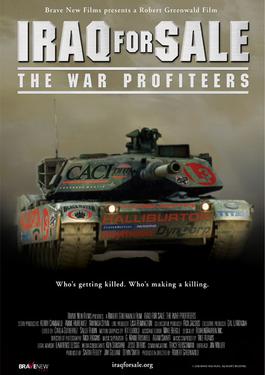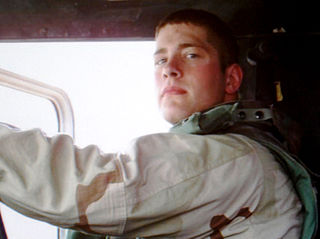
A private military company (PMC) or private military and security company (PMSC) is a private company providing armed combat or security services for financial gain. PMCs refer to their personnel as "security contractors" or "private military contractors".
Academi, formerly known as Blackwater, is an American private military contractor founded on December 26, 1996, by former Navy SEAL officer Erik Prince. It was renamed Xe Services in 2009, and was again renamed to Academi in 2011, after it was acquired by a group of private investors. In 2014, Academi merged with Triple Canopy to form Constellis Holdings.

The First Battle of Fallujah, code-named Operation Vigilant Resolve, was an operation against militants in Fallujah as well as an attempt to apprehend or kill the perpetrators of the killing of four U.S. contractors in March 2004.

The Second Battle of Fallujah, initially codenamed Operation Phantom Fury,Operation al-Fajr was an American-led offensive of the Iraq War that lasted roughly six weeks, starting 7 November 2004. Marking the highest point of the conflict against the Iraqi insurgency, it was a joint military effort carried out by the United States, the Iraqi Interim Government, and the United Kingdom. Within the city of Fallujah, the coalition was led by the U.S. Marine Corps and U.S. Army, the battle was later described as "some of the heaviest urban combat U.S. military have been involved in since the Battle of Huế City in Vietnam in 1968".
Stephen "Scott" Helvenston was a United States Navy SEAL. He was working as a security contractor for Blackwater Security when he was killed in the 31 March 2004 Fallujah ambush within days of arriving in Iraq.

The United States bombardment of Fallujah began in April 2003, one month after the beginning of the invasion of Iraq. In April 2003 United States forces fired on a group of demonstrators who were protesting against the US presence. US forces alleged they were fired at first, but Human Rights Watch, who visited the site of the protests, concluded that physical evidence did not corroborate US allegations and confirmed the residents' accusations that the US forces fired indiscriminately at the crowd with no provocation. 17 people were killed and 70 were wounded. In a later incident, US soldiers fired on protesters again; Fallujah's mayor, Taha Bedaiwi al-Alwani, said that two people were killed and 14 wounded. Iraqi insurgents were able to claim the city a year later, before they were ousted by a siege and two assaults by US forces. These events caused widespread destruction and a humanitarian crisis in the city and surrounding areas. As of 2004, the city was largely ruined, with 60% of buildings damaged or destroyed, and the population at 30%–50% of pre-war levels.
Eurest Support Services (ESS) is a subsidiary of the catering company Compass Group PLC specializing in harsh-environment large-scale food service and facilities management. Its primary clients are military forces and other security services, major defense contractors, and construction, mining, and oil exploration and production facilities worldwide.

Iraq for Sale: The War Profiteers is a 2006 documentary film made by Robert Greenwald and Brave New Films. Produced while the Iraq War was in full swing, the film deals with the alleged war profiteering and negligence of private contractors and consultants who went to Iraq as part of the US war effort.

The 2004 Iraq spring fighting was a series of operational offensives and various major engagements during the Iraq War. It was a turning point in the war; the Spring Fighting marked the entrance into the conflict of militias and religiously based militant Iraqi groups, such as the Shi'a Mahdi Army.

Blackwater: The Rise of the World's Most Powerful Mercenary Army is a book written by independent journalist Jeremy Scahill, published by Nation Books in 2007, as a history and analysis of Blackwater USA, now called Academi. It won one of the 2007 George Polk Awards.
The 2004 Fallujah Blackwater incident occurred on March 31, 2004, when Iraqi insurgents attacked a convoy containing four American contractors from the private military company Blackwater USA who were conducting a delivery for food caterers ESS.
Coalition Provisional Authority Order 17 stated that Iraqi laws do not hold over contractors.
The Nisour Square massacre occurred on September 16, 2007, when employees of Blackwater Security Consulting, a private military company contracted by the US government to provide security services in Iraq, shot at Iraqi civilians, killing 17 and injuring 20 in Nisour Square, Baghdad, while escorting a U.S. embassy convoy. The killings outraged Iraqis and strained relations between Iraq and the United States. In 2014, four Blackwater employees were tried and convicted in U.S. federal court; one of murder, and the other three of manslaughter and firearms charges; all four convicted were controversially pardoned by President Donald Trump in December 2020. U.N. experts said the pardons "violate U.S. obligations under international law and more broadly undermine humanitarian law and human rights at a global level”.

Atban v. Blackwater, 611 F. Supp. 2d 1, was a lawsuit brought by the victims and families affected by the September 16, 2007 Blackwater Baghdad shootings against Blackwater Worldwide, a private military contractor since renamed Academi. The case was consolidated with Estate of Albazzaz, et al. v. Blackwater Lodge and Training Center, Inc. et al., and the consolidated case was ultimately settled confidentially out of court.

The Road to Fallujah is a 2009 American documentary film directed by Mark Manning and written by Manning and Natalie Kalustian.

The 2004 Good Friday ambush was an attack by Iraqi insurgents on April 9, 2004 during the Iraq War on a convoy of U.S. supply trucks during the Battle of Baghdad International Airport. It happened in the midst of the Iraq spring fighting of 2004, which saw intensified clashes throughout the country.
Susan L. Burke is an American lawyer noted for her work to reform the military system of prosecuting rape and assault and in representing plaintiffs suing the American military or military contractors, such as the Abtan v. Blackwater case. She represented former detainees of Abu Ghraib prison in a suit against interrogators and translators from CACI and Titan Corp. who were tasked with obtaining military intelligence from them during their detention. Her work was featured in the documentaries The Invisible War and Ghosts of Abu Ghraib. In 2015, the National Law Journal named Burke one of the top 75 female attorneys in the nation.

Triple Canopy, Inc., is an American private security company that provides integrated security, mission support and risk management services to corporate, government and nonprofit clients. The firm was founded in May 2003 by United States Army Special Forces veterans, including former Delta Force operators. In June 2014, the firm merged with rival security contracting firm Academi, formerly Blackwater, to form Constellis Group, with Craig Nixon, the former CEO of Academi, becoming the CEO of Constellis Group, and training facilities being consolidated at the existing Academi training facility in North Carolina. It was staffed by, among others, a number of former Army Special Operations personnel, Green Berets, Rangers, SEALs, MARSOC Raiders, other special operations personnel, and several law enforcement officers. At the time of the merger, over 5,000 employees were working for Triple Canopy.
Ahmad Hashim Abd al-Isawi was an al Qaeda terrorist operating in Iraq in the early 2000s. He allegedly masterminded the ambush and killing of four American military contractors whose bodies were then dragged by a spontaneously formed mob and hung from the old bridge over the Euphrates river in Fallujah, Iraq. In September 2009, a team of U.S. Navy SEALs captured al-Isawi in a nighttime raid in Fallujah, and he was charged with orchestrating the slayings. He was held for a time by the United States intelligence community and accused some of the SEALs who captured him of mistreating him while detained at Camp Schwedler. al-Isawi was subsequently handed over to Iraqi authorities and was awaiting his own trial when he testified at one of the resulting 2010 courts-martial. His own trial was held some time before November 2013, and al-Isawi was executed by hanging for the killings.